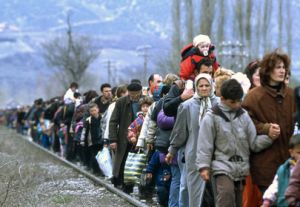Global Refugee Problem Bigger Than Ever
By Portia Crowe, IPS, May 23 2011
This year marks the 60th anniversary of the landmark 1951 U.N. Convention on the Status of Refugees defining their rights and states’ legal obligations to protect them. The treaty came into effect shortly after the end of the Second World War and was designed to deal with the vast number of refugees across Europe. Since that time, the U.N. refugee agency has expanded to assist in housing and repatriating refugees from around the world, displaced for a variety of reasons, although some critics argue it has become a relic of the post-war period.
Erika Feller, assistant high commissioner for protection in the Office of the U.N. High Commissioner for Refugees (UNHCR), strongly disagrees.
“To those who say the 1951 convention is outdated or not fit for its purpose… I say, they don’t understand the purpose of the convention,” she told IPS.
“It is not outdated to have a convention which prevents the return of people to situations where their life or freedom is seriously threatened. It’s not outdated to have a convention which prevents discriminatory treatment on the grounds of nationality, on the grounds of ethnic origin. It’s not outdated to provide for basic civil, social, economic, and political rights for individuals in your countries for as long as you’re hosting them as refugees,” she said.
Rather than a time for revision, Feller sees the anniversary as an opportunity to “really ask states to recommit to the basics of refugee protection”.
There are currently about 10 million refugees around the world, with more than half in Asia and some 20 percent in Africa.
In addition to refugees, defined as people who cross national borders due to conflict, persecution or natural disasters, there are also some 26 million internally displaced people, or IDPs, who have become uprooted within their own countries.
Feller acknowledged that the UNHCR faces contemporary issues that are “beyond the classical refugee problem” – for example, the increasing number of people displaced by environmental disasters and climate change. “But I don’t think that makes the convention outdated in its essence,” she said.
Livio Zilli, a refugee researcher at Amnesty International, said the debate around the convention’s usefulness is “an interesting academic discussion”, but that, in reality, its relevance to refugee protection was “undisputed”.
“I think the intellectual arguments are great, but sometimes they can actually be somewhat sterile because the primary focus should be on implementing the convention and [safeguarding] the rights of refugees,” he told IPS.
Zilli stressed the significance of the UNHCR’s mandate, which has a much broader reach than the convention itself. He noted its importance for IDPs, who are not accounted for in the 1951 treaty.
The addition of further protocols to the convention – and the attention that that would draw – might “provide avenues to states to divert attention from their failures to comply with the convention, or to actually accede to the convention,” he cautioned.
Many governments have not signed or ratified the 1951 document. Although the UNHCR operates in about 120 countries, the convention has not been signed by Cuba, Indonesia, or, notably, Thailand, which houses more than 100,000 official – and an additional 50,000 unregistered – refugees from neighbouring Burma. They live in nine camps along the country’s border, which they cannot leave for fear of being returned home.
The primary objective of the UNHCR is to call for these and other countries to sign the treaty, according to Feller.
She also discussed Malaysia, another non-signatory, whose government is striking a “trade” with Australian officials. It will send 4,000 refugees to Australia for resettlement, in exchange for the return of 800 Malaysians who sought asylum there.
As the convention’s Jul. 28 anniversary draws near, Zilli, like Feller, hopes it will spark the right kind of dialogue, and renew pressure on countries like Thailand and Malaysia to sign and ratify the document.
“The focus should be on the inability or unwillingness of states to implement the convention, and [of others] to comply with their obligations under the convention,” he said.
The UNHCR is aiming to harness the international attention and put it to use this December at a high-level ministerial meeting.
It is intended to be a pledging conference, and will be asking governments “not to come and only make general statements but to pledge commitment to doing things that will change the course of refugee protection in a positive way,” Feller said, adding that the UNHCR had every intention of recording pledges and asking governments to honour them.
She hoped that both civil society and the media would have a large presence at the conference, which is projected to lead to a new action plan for committing to refugee protection.
“Refugee protection is not a thing of the past,” Feller said. “Refugee protection is a very, very pressing requirement of the present, and a huge challenge for the future.”
(END)




